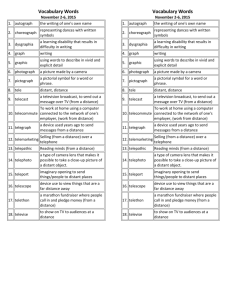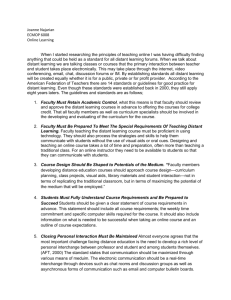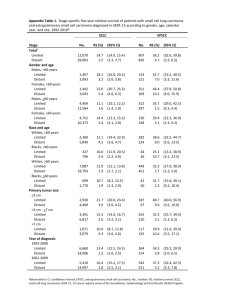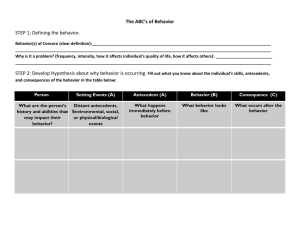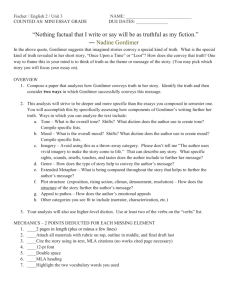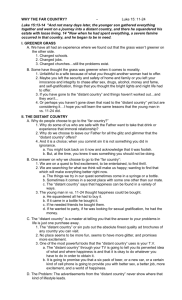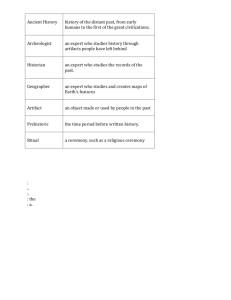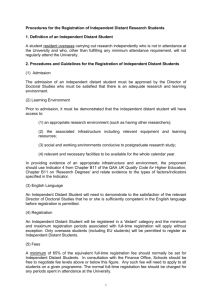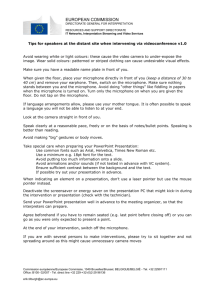File
advertisement
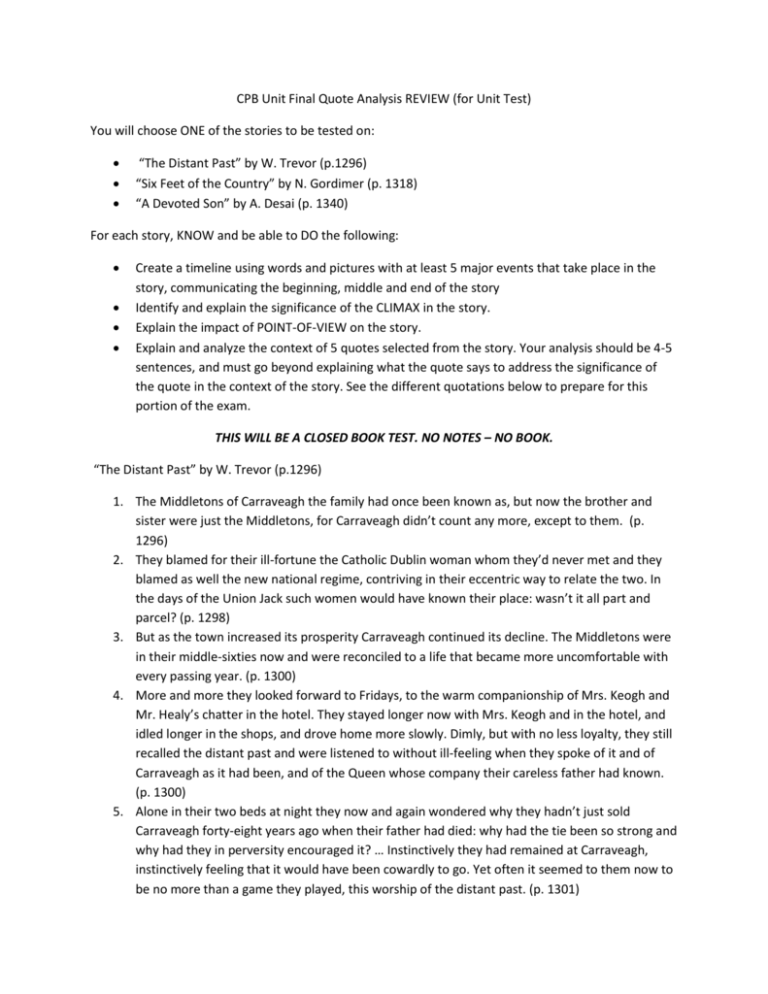
CPB Unit Final Quote Analysis REVIEW (for Unit Test) You will choose ONE of the stories to be tested on: “The Distant Past” by W. Trevor (p.1296) “Six Feet of the Country” by N. Gordimer (p. 1318) “A Devoted Son” by A. Desai (p. 1340) For each story, KNOW and be able to DO the following: Create a timeline using words and pictures with at least 5 major events that take place in the story, communicating the beginning, middle and end of the story Identify and explain the significance of the CLIMAX in the story. Explain the impact of POINT-OF-VIEW on the story. Explain and analyze the context of 5 quotes selected from the story. Your analysis should be 4-5 sentences, and must go beyond explaining what the quote says to address the significance of the quote in the context of the story. See the different quotations below to prepare for this portion of the exam. THIS WILL BE A CLOSED BOOK TEST. NO NOTES – NO BOOK. “The Distant Past” by W. Trevor (p.1296) 1. The Middletons of Carraveagh the family had once been known as, but now the brother and sister were just the Middletons, for Carraveagh didn’t count any more, except to them. (p. 1296) 2. They blamed for their ill-fortune the Catholic Dublin woman whom they’d never met and they blamed as well the new national regime, contriving in their eccentric way to relate the two. In the days of the Union Jack such women would have known their place: wasn’t it all part and parcel? (p. 1298) 3. But as the town increased its prosperity Carraveagh continued its decline. The Middletons were in their middle-sixties now and were reconciled to a life that became more uncomfortable with every passing year. (p. 1300) 4. More and more they looked forward to Fridays, to the warm companionship of Mrs. Keogh and Mr. Healy’s chatter in the hotel. They stayed longer now with Mrs. Keogh and in the hotel, and idled longer in the shops, and drove home more slowly. Dimly, but with no less loyalty, they still recalled the distant past and were listened to without ill-feeling when they spoke of it and of Carraveagh as it had been, and of the Queen whose company their careless father had known. (p. 1300) 5. Alone in their two beds at night they now and again wondered why they hadn’t just sold Carraveagh forty-eight years ago when their father had died: why had the tie been so strong and why had they in perversity encouraged it? … Instinctively they had remained at Carraveagh, instinctively feeling that it would have been cowardly to go. Yet often it seemed to them now to be no more than a game they played, this worship of the distant past. (p. 1301) 6. Slowly the change crept about, all around them in the town, until Fat Driscoll didn’t wish it to be remembered that he had ever given them mince for their dog. He had stood with a gun in the enemy’s house, waiting for soldiers so that soldiers might be killed: it was better that people should remember that. (p. 1303) 7. For fifty years they had experienced, after suspicion had seeped away, a tolerance that never again in the years that were left to them would they know. (p. 1304) 8. Because of the distant past they would die friendless. It was worse than being murdered in their beds. (p. 1304) “Six Feet of the Country” by N. Gordimer (p. 1318) 1. And for a moment I accept the triumph as if I had managed it—the impossibility that I’ve been trying for all my life—just as if the truth was that you could get it “both ways,” instead of finding yourself with not even one way or the other but a third, one you had not provided for at all. (p. 1320) 2. When Johannesburg people speak of “tension” they don’t mean hurrying people in crowded streets, the struggle for money, or the general competitive character of city life. They mean the guns under the white men’s pillows and the burglar bars on the white men’s windows. They mean those strange moments on city pavements when a black man won’t stand aside for a white man. (p. 1320) 3. He just kept on looking at me, out of his knowledge that white men have everything, can do anything; if they don’t, it is because they won’t. (p. 1324) 4. On five pounds a month, Petrus won’t have twenty pounds—and just as well, since it couldn’t do the dead any good. Certainly I should not offer it to him myself. Twenty pounds—or anything else within reason, for that matter—I would have spent without grudging it on doctors or medicines that might have helped the boy when he was alive. Once he was dead, I had no intention of encouraging Petrus to throw away, on a gesture, more than he spent to clothe his whole family in a year. (p. 1324) 5. I took it in irritation more than in astonishment, really—irritation at the waste, the uselessness of this sacrifice by people so poor. Just like the poor everywhere, I thought, who stint themselves the decencies of life in order to insure themselves the decencies of death. So incomprehensible to people like Lerice and me, who regard life as something to be spent extravagantly and, if we think about death at all, regard it as the final bankruptcy. (p. 1325) 6. In the coffin was someone no one had ever seen before: a heavily built, rather light-skinned native with a neatly stitched scar on his forehead—perhaps from a blow in a brawl that had also dealt him some other, slower-working injury which had killed him. (P. 1327) 7. At last, it became clear that we would never get Petrus’s brother back, because nobody really knew where he was. Somewhere in a graveyard as uniform as a housing scheme, somewhere under a number that didn’t belong to him, or in the medical school, perhaps, laboriously reduced to layers of muscles and strings of nerves? Goodness knows. He had no identity in this world anyway. (p. 1328) 8. The old man from Rhodesia was about Lerice’s father’s size, so she gave him one of her father’s old suits and he went back home rather better off, for the winter, than he had come. (p. 1328) “A Devoted Son” by A. Desai (p. 1340) 1. When the results appeared in the morning papers, Rakesh scanned them, barefoot and in his pajamas, at the garden gate, then went up the steps to the veranda where his father sat sipping his morning tea and bowed down to touch his feet. (p.1340) 2. What was more, he came back, he actually returned to that small yellow house in the once-new by increasingly shabby colony, right at the end of the road where the rubbish vans tipped out their stinking contents for pigs to nose in and rag-pickers to build their shacks on, all steaming and smoking just outside the neat wire fences and well-tended gardens. O this Rakesh returned and the first thing he did on entering the house was to slip out of the embraces of his sisters and brothers and bow down and touch his fathers feet. (p. 1342) 3. Thereafter his fame seemed to grow just a little dimmer – or maybe it was only that everyone in town had grown accustomed to it at last – but it was also the beginning of this fortune for now became known not only as the best but also the richest doctor in town. (p. 1343) 4. Old Varma nodded with melancholy triumph. “That is how he treats me—after I have brought him up, given him an education, made him a great doctor. Great doctor! This is the way great doctors treat their fathers, Bhatia,” for the son’s sterling personality and character now underwent a curious sea change. Outwardly all might be the same but the interpretation had altered: his masterly efficiency was nothing but cold heartlessness, his authority was only tyranny in disguise. (p. 1347) 5. “Let me be,” Varma begged, turning his face away from the pills on the outstretched hand. “Let me die. It would be better. I do not want to live only to eat your medicines.” 1348 6. The quantities of vitamins and tonics he was made to take were not altogether useless. They kept him alive and even gave him a kind of strength that made him hang on long after he ceased to wish to hang on. It was as though he were straining at a rope, trying to break it, and it would not break, it was still strong. He only hurt himself, trying. (p. 1348) 7. Then he spat out some words, as sharp and bitter as poison, into his son’s face. “Keep your tonic—I want none—I want none—I won’t take any more of—of your medicines. None. Never,” and he swept the bottle out of his son’s hand with a wave of his own, suddenly grand, suddenly effective. (p. 1349) 8. He gave one push to the pillows at his back and dislodged them so he could sink down on his back, quite flat again. He closed his eyes and pointed his chin at the ceiling, like some dire prophet, groaning, “God is calling me—now let me go.” (p. 1349)

